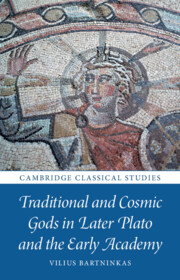This book has its roots in my work for an MPhil and a PhD at the University of Cambridge. It began as a study of Plato’s political philosophy, but I gradually became fascinated with religion, theology and cosmology. For this transformative journey, I am first and foremost thankful to Gábor Betegh, whose supervisions were an endless source of discoveries, inspiration, guidance and care. I am grateful for continuing our conversation to this day. It nourished this book in truly exciting and unexpected ways. My thanks also go to Nicholas Denyer, who was a critical, but always patient and helpful, reader of my work. I could not have asked for better teachers.
The present shape of the book is considerably influenced by Shaul Tor and James Warren, the examiners of my doctoral thesis, which was defended in 2019. Their insightful comments and invaluable suggestions guided the revision of the manuscript over the course of my postdoctoral fellowship at Vilnius University. Vytautas Ališauskas helped with the return to my alma mater and gave inexhaustible support to writing this book. The anonymous reviewers of the Cambridge Classical Studies series as well as the editors, James Clackson and Michael Sharp, provided careful observations and useful proposals that formed the final version of this book. John Dillon has read the completed manuscript and given excellent suggestions that saved me from a number of errors. I sincerely thank all of them. Needless to say, they are not responsible for the mistakes left in it.
My doctorate was funded by the Arts and Humanities Research Council (Cambridge AHRC Doctoral Training Partnership), the Cambridge Commonwealth, European and International Trusts (Le Bas Cambridge Scholarship) and Pembroke College, Cambridge (Pembroke Graduate Studentship). My postdoctoral fellowship was funded by Vilnius University. I am grateful to these institutions for making my research possible.
Throughout this book I use, slightly modified, Reference GrubeGrube’s (1974) translation of the Republic, Reference ZeylZeyl’s (2000) translation of the Timaeus, Reference SchofieldGriffith’s (2017) translation of the Laws, Reference McKirahan and CooperMcKirahan’s (1997) translation of the Epinomis and Reference GuthrieGuthrie’s (1939) text and translation of Aristotle’s De Caelo. All remaining translations from Greek and Latin sources are my own unless otherwise stated. The Greek texts of Plato’s dialogues are from Reference BurnetBurnet’s (1968) edition, except for the Epinomis, for which I follow Reference TaránTarán’s (1975) edition.
A shorter version of Sections 3.2–3.4 is published as a paper titled ‘Imitating the traditional gods: moral virtues and cult practice in Plato’s Laws’ in Mnemosyne (2021, advance articles). Its material was revised and adapted to the purposes of the present monograph. I would like to thank the publisher for the permission to reuse this article.
Philosophy is never a lonely business. I had a wonderful teacher manifesting in the collective body of the B Caucus at Cambridge. During my time there, I have greatly benefited from conversations with Chiara Blanco, Naoya Iwata, Christian Keime, Lea Niccolai, Caterina Pellò, Salla Raunio, Alessio Santoro, David Sedley, Frisbee Sheffield, Máté Veres, Di Yan. Various parts of this work were presented in Tartu, London, Oxford, Lille, Brasília, Guangzhou, Vilnius and Fribourg. I would like to thank my audiences for comments, critique and further suggestions, and in particular Giulia De Cesaris, Gabriele Cornelli, Bram Demulder, Dimitri El Murr, Edith Hall, Máté Herner, Philip Horky, Toomas Lott, Irmgard Maennlein-Robert and Riin Sirkel. I am especially grateful to Aistė Kiltinavičiūtė for reading the entire book and helping me to improve my English. Her kindness and generosity are beyond any limits. I also wish to thank all the fellow classicists, philosophers and political scientists at home who encouraged this project, especially Mantas Adomėnas, Marijuš Antonovič, Simonas Baliukonis, Simas Čelutka, Nijolė Juchnevičienė, Audronė Kučinskienė, Rytis Martikonis and Laurynas Peluritis.
This book could not have been conceived and completed without the unconditional love of my family and friends. A detailed account of my debt to all of them would probably amount to writing a novel. That being said, I would like to express my gratitude to my mother Rima Glušnienė and my dear friend Aistė Noreikaitė for giving their unfailing support in the most critical moments. Most importantly, I want to thank Mindaugas Aušra for everything that he has shared with me during all those years in Vilnius, Cambridge and then back in Vilnius again. His partnership and boundless love have safely navigated me through this challenge.

